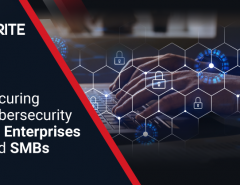SMBs are increasingly evaluating security vendors on the basis of their endpoint encryption services and other related features. While managed security services are mostly outsourced, a better part of an organization’s security posture depends on how the endpoints are taken care of. Small businesses, therefore, should always be mindful of the endpoint security services and must ask certain questions to the potential service providers before deploying their services. Before investing in an endpoint security vendor, companies must evaluate and analyze a few aspects by putting across a basic yet important questionnaire.
Question 1: How good are the Core Services?
Answer: While there are multiple viewpoints to endpoint security, the core functionalities should never be ignored. An experienced security vendor must be able to deliver the basic functions like malware scanning, firewall protection and device controlling. If an endpoint security vendor performs well in the mentioned categories, it can easily be considered as a potential service provider. Companies must duly refrain from hiring vendors that rely on obsolete, signature-specific protection techniques. Instead, the emphasis must be on the concepts of behavioral detection, whitelisting and sandboxing; techniques that are commonly used by the best in the business.
Question 2: Are the Services Device Specific?
Answer: It is always advisable to hire an endpoint security vendor that has multi-channel and multi-device compatibility in place. A functional endpoint security module must be able to cover multiple servers and devices while supporting diverse platforms in the process. If a vendor tries to persuade an organization for working on a specific platform in order to simplify its modus operandi, it is definitely not the right option to go with.
Read more: 5 Critical corporate cybersecurity risks for SMBs
Question 3: What are the Most Desirable Service Sets?
Answer: A trusted endpoint security service provider must be able to offer exceptional data protection services and enhanced scalability— all rolled into a single module. In addition to that, patch management is also a desirable feature that every experienced endpoint security service provider must look to offer. Moreover, with GDPR compliance evolving into such a big factor, it is essential that service providers must take the regulations into account and equip organizations with considerable levels of flexibility. Apart from that, credible endpoint security vendors should allow the concerned organizations to access information in the form of granular data. Be it the viewpoint information or push notifications, the company must always be in touch with the user data.
Question 4: What Sets the Vendor apart when compared to other Service Providers?
Answer: An organization must be able to identify endpoint security vendors that offer advanced services like intrusion detection, web filtering, application control, asset management and spam protection. The focus should be on securing the endpoints in a proactive manner instead of opting for reactive measures in case of a breach.
Read more: Data Security: Where are the SMBs failing in securing their data
Question 5: Are there Contingencies in Place?
Answer: Although an endpoint security vendor is equipped with a pre-defined catalogue of services, it is important to take a note of the contingency plans in place. That said, there are many updated malware threats lurking in the vicinity and at times when even the best in the business fails to detect the issues. A powerful endpoint security vendor must be able to adapt to the inclement situations by devising contingencies, as and when required.
While each one of the mentioned questions needs to be answered by the potential security vendors, companies must also check for the customer support on offer. Endpoints are prone to threats and it is important that organizations hire the best in business, depending on the professional requirements.
As an IT security partner for your business, Seqrite provides comprehensive security from advanced cyber threats. To know more




